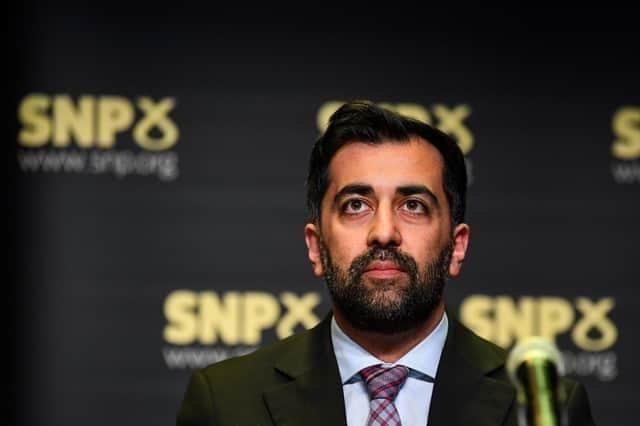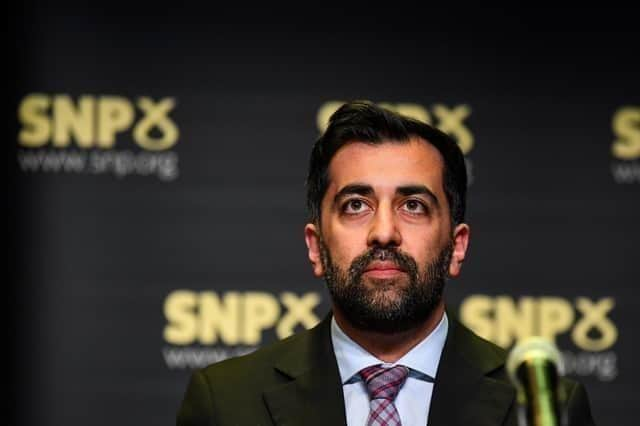Humza Yousaf will hope for a fresh start in 2024 as general election looms
Humza Yousaf will enter the new year hoping for a fresh start. To say the First Minister has endured a bruising nine months is something of an understatement.
Within days of being sworn into office at the end of March, police swooped on the home of his predecessor, Nicola Sturgeon, and her husband Peter Murrell.
Advertisement
Hide AdAdvertisement
Hide AdThe ongoing police investigation into the SNP's funding and finances has cast a dark shadow over the party. Mr Yousaf will hope that gloom soon lifts.


After all, whatever happens could have a significant impact on the upcoming general election, widely expected to take place at some point in 2024.
The SNP is already approaching this with a sense of trepidation. Polls show its support has taken a hit, and the by-election in Rutherglen and Hamilton West in October provided further proof of a party in trouble. The Nationalists expected to lose, but a 20.4 per cent swing to Labour was the stuff of nightmares.
Labour is now targeting as many as two dozen seats in Scotland, which would have been unheard of not so long ago.
It hopes to make gains across the central belt, particularly in its former heartlands of Glasgow and Lanarkshire, but also in Edinburgh and the Lothians and up into Fife. "I would say somewhere between 12 and 20 seats would be our current thinking," said one senior Labour figure.


Mr Yousaf’s party has pledged to use the general election to push for independence. It will claim victory if it wins a majority of seats (29), but in reality there is a little prospect of a future UK Government agreeing to a second referendum any time soon.
Those close to the First Minister say focus groups provide a source for optimism. They show people react favourably to the Scottish Government’s record, and individual policies are popular. “The record really makes a difference,” said one insider. “There’s a good opportunity for us to get that across.”
No one disputes the difficult circumstances facing the Scottish Government, however. The draft Scottish Budget, published on December 19, paved the way for income tax rises for higher earners, as well as significant funding cuts for higher education, mental health and housing.
Advertisement
Hide AdAdvertisement
Hide AdThe first few weeks of 2024 will throw up other challenges. For one thing, the saga over the £11,000 data roaming bill racked up on Michael Matheson's Holyrood-issued iPad has yet to draw to a close.
The health secretary is currently being investigated by the Scottish Parliamentary Corporate Body, which is likely to publish its findings in February. The cross-party group could then choose to refer the matter to Holyrood's standards committee, meaning the whole thing could drag on for months.
The First Minister has so far chosen to stand by Mr Matheson, but politics can be a fickle business. A poll in November found a majority of the Scottish public think the health secretary should resign. He may yet choose to throw in the towel himself.
Elsewhere, the Scottish and UK Covid inquiries will continue to take evidence on the pandemic, including from senior figures north of the border. From January 16, the UK probe will hold two weeks of public hearings at the Edinburgh International Conference Centre.
Concerns have already been raised over the status of Nicola Sturgeon’s pandemic WhatsApp messages. The former first minister has refused to say whether these have been deleted. As the focus shifts from Downing Street to Bute House, will her administration emerge unscathed? Tough questions will rightly be asked of those whose decisions affected the lives of millions.
The coming year will also see some legislative milestones. Liberal Democrat MSP Liam McArthur is pushing ahead with a Bill to legalise assisted dying in Scotland, which is expected to be lodged early in the new year.
This would allow terminally ill and mentally competent adults to end their lives, and is the third attempt to pass such legislation in Holyrood. Mr McArthur believes MSPs will back it, but the issue remains hugely contentious.
Labour MSP Pam Duncan-Glancy, a wheelchair user, previously called the proposals "dangerous for disabled people", while religious figures have also voiced their opposition. The wider debate, and how it is handled, will be a significant moment for Scotland.
Advertisement
Hide AdAdvertisement
Hide AdMeanwhile, the SNP’s flagship National Care Service plan – billed as the most ambitious public sector reform since the creation of the NHS – will begin its passage through the Scottish Parliament in January. The proposals have been substantially redrawn and delayed following a backlash from councils and trade union leaders, but will still attract controversy.
Away from the day-to-day legislative grind, 2024 could also see a wider conversation opened up as Holyrood marks 25 years of devolution. The Scottish Parliament was famously “reconvened” by the late Winnie Ewing on May 12, 1999, and few would dispute the central role it has played in the ensuing decades.
But has it lived up to the hopes and expectations of those who fought for it? Many don’t think so – not least within Labour, the party that secured devolution. There are real concerns over “toothless” committees and weak backbench MSPs.
"You can't meaningfully hold the executive [government] to account in this place," complained one Labour figure. "There's no culture of dissent within the parties – and when I say the parties, I mean the SNP."
Opinions will differ, of course, but the coming year will offer a chance for some serious soul-searching.
And then there is Alex Salmond. The former first minister is suing the Scottish Government after its mishandling of harassment complaints made against him. The case has been put on hold, but Mr Salmond insists a “day of reckoning” will inevitably come.
The tectonic plates of Scottish politics shifted over the last 12 months. Ms Sturgeon’s resignation and its aftermath altered the terrain. What will emerge once the tremors have finally subsided remains to be seen.
Comments
Want to join the conversation? Please or to comment on this article.
